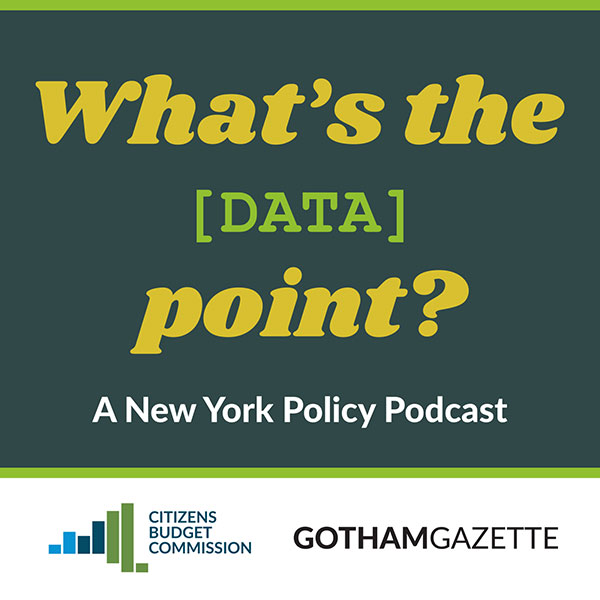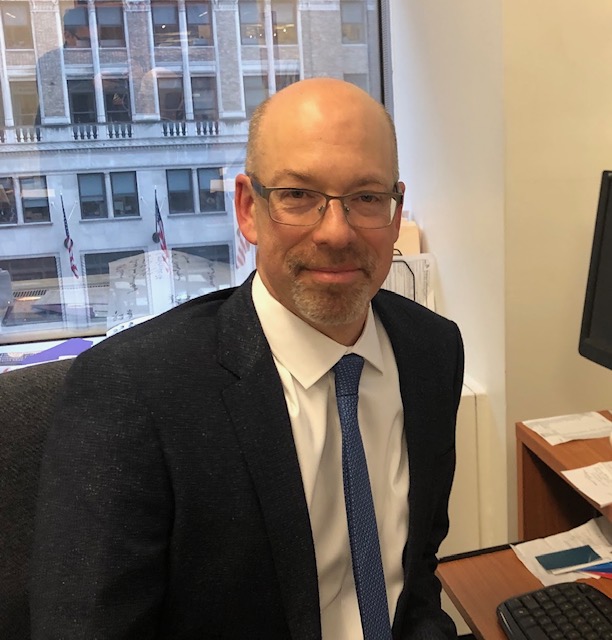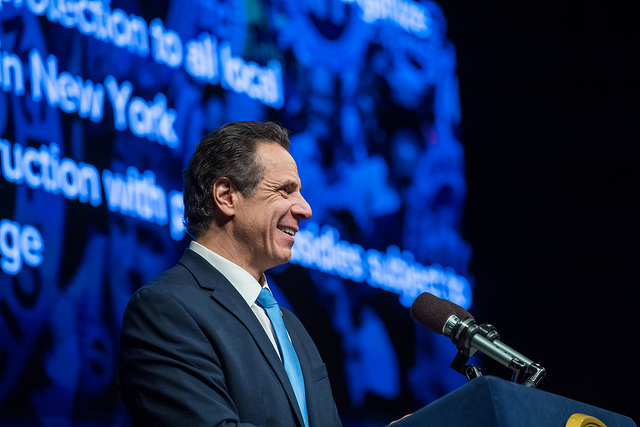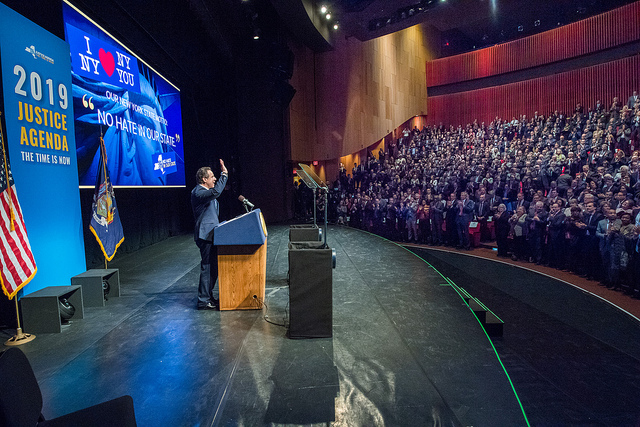What's The [Data] Point? $175.2 Billion, Cuomo's Executive Budget

What's The [Data] Point? Episode 62 -- $175.2 Billion, Cuomo's Executive Budget, with Andrew Rein of CBC [You can download What's The [Data] Point? wherever you get your podcasts, including on iTunes]

$175.2 billion is the size of Governor Andrew Cuomo's Executive Budget plan for Fiscal Year 2020, unveiled earlier this week and now the basis for hearings and negotiations with the Legislature.
The New York budget is one of the largest government budgets in the world, and it’s poised to grow 4 percent over this year’s budget for fiscal year 2019. The Governor has included proposals for everything from congestion pricing to recreation marijuana and sports gambling legalization. Of particular note are significant spending increases on priorities such as education that are backed by a five-year extension of the income tax surcharge on millionaires. Andrew Rein, new president of Citizens Budget Commission, joined the hosts to give an initial assessment of the Governor's budget plan.
Listen to the conversation and let us know what you think: Ben Max of GG (@TweetBenMax), Maria Doulis of CBC (@MariaDoulis). Listen below or download wherever you get your podcasts!
***
by Ben Max, Gotham Gazette
@tweetBenMax @GothamGazette
15 Notable Cuomo Proposals Not In His State of the State Speech

Gov. Cuomo (photo via the Governor's office)
In his expansive State of the State speech on Tuesday, Governor Andrew Cuomo articulated wide-ranging priorities for the legislative session and the budget for the 2020 fiscal year that is due April 1. But there was plenty left unsaid in the 80-minute speech, included instead in the detailed policy book and budget documents released along with the governor’s address. Some of those proposals could have broad social and economic consequences for the state should they come to pass, with many likely to move forward as Democrats control the entire State Legislature.
But the governor has also been known to include proposals in past policy books and budgets without putting any political capital behind them once negotiations with the Legislature are underway. Below is a list of notable Cuomo proposals that didn’t make it into the governor’s speech:
Increasing protections against harassment in the workplace
Though the governor has touted passing last year the strongest laws in the nation against sexual harassment in the workplace, he did not mention them at all during his State of the State speech. Nonetheless, his plans do include proposals to expand the protections passed last year, including by lowering what some have called onerous standards for proving harassment under the Human Rights Law, mandating that non-disclosure agreements articulate a victim’s right to file a complaint or participate in an investigation, and requiring workplaces to prominently display sexual harassment informational posters.
The governor and legislators have been under pressure from advocates and some lawmakers to hold public hearings on sexual harassment in both the public and private sector -- hearings that were not held before last year’s laws were passed -- and to strengthen the new laws. While Cuomo included enhanced laws in his proposals, legislative leaders announced a joint hearing for February 13.
Cuomo is also proposing removal of the statute of limitations for reporting rape.
Pursuing universal access to health care
The governor will establish a commission comprised of the Department of Health, Department of Financial Services, health care and insurance experts to explore how the state can provide universal access to health care in the state. The commission would have to issue a report by December 1.
Cuomo has dismissed calls from legislators and advocates to support creation of a single-payer health care system in New York, but outlined several health care proposals in his speech and included the commission in his written plans.
Criminal penalties for assaulting the press
Taking direct aim at President Donald Trump’s repeated attacks on the free press, including calling journalists the “enemy of the people,” and accusations of “fake news” against reporters, Cuomo, who has had his own issues with the press, is proposing legislation that would make it a felony to assault a journalist while they are doing their job. Journalists would join several other classes of worker, such as nurses, in this category.
Creating a database of economic development deals
Cuomo’s budget proposes several reforms to state contracting processes, which have been at the center of recent corruption scandals that have marred his administration. Among those reforms is an online database of economic development projects that receive state assistance. Good government advocates have repeatedly called for that “database of deals” to provide more accountability for state spending and the Legislature has in the past promised to pass such legislation even if the governor did not support it.
It’s unclear if the database the governor has in mind will meet the expectations of those who have demanded such a public accounting, which would ideally show investments and their results in granular detail.
Protecting undocumented immigrants from deportation
The governor backed the “One Day to Save New Yorkers” bill, a small but significant change to sentencing for Class A misdemeanors. The bill would reduce the maximum punishment for such offenses from 365 days -- exactly one year -- to 364, in an effort to protect undocumented immigrants who, if convicted of crimes with a sentence of one year or more, could face deportation proceedings.
A permanent watchdog over police-involved killings
Cuomo signed an executive order in 2015 giving the state Attorney General the authority of a special prosecutor to investigate instances where unarmed civilians are killed by law enforcement officers. His budget proposal includes support for legislation to codify that order by creating a permanent special counsel to probe such incidents, something he has backed in the past.
Additionally, Cuomo’s budget would require all law enforcement agencies across the state to implement a use-of-force policy and to collect and report all data on incidents where the use of force leads to death or injury.
Tackling lead exposure among children
The governor has proposed lowering the threshold of blood lead levels in children that would trigger intervention by public health officials. The proposal could be particularly significant for New York City, where the city’s public housing authority (NYCHA) has been sued in federal court for failing to deal with lead paint in its apartments (and covering up missed inspections) while Mayor Bill de Blasio has repeatedly downplayed the number of children exposed to lead.
Creating a new agency to help domestic violence survivors
The budget proposes creating a new state agency called the Division of Victim Prevention and Response, by consolidating the Office for the Prevention of Domestic Violence, the Office of Victim Services, and the Office of Campus Safety.
The governor is also proposing legislation to modernize policies for providing relief to domestic violence survivors -- no longer requiring them to pay certain costs for staying in a domestic violence shelter and removing the requirement that they must apply for public assistance. He is also creating a task force to study the state’s service delivery system for survivors. Cuomo is also pushing the Domestic Violence Survivors Justice Act, which would expand certain protections for survivors caught up in the criminal justice system.
Protecting breastfeeding mothers from workplace discrimination
The governor intends to propose legislation that would clearly establish lactation as a pregnancy-related condition covered by the state’s Human Rights Law. It would ensure that employers provide reasonable accommodations for breastfeeding women (i.e. to pump) or be liable under the law.
Expanding protections against wage theft
In his “first 100 days” agenda, Cuomo spoke about passing new protections for the freelance and gig economy but made no reference to it on Tuesday and his policy book only mentions it sparingly, in its introductory section. What the document does include is a proposal to expand criminal penalties for wage theft, a crime of which freelancers and gig workers often find themselves the victims. The budget proposes changing the state’s labor law and establishing an expanded range of violations, from misdemeanors to felonies, for wage theft. It would also give the state Department of Labor the authority to refer cases for criminal prosecution.
Protecting sex trafficking victims
The budget commits to closing loopholes in the state’s rape shield laws, which are meant to protect victims of sexual violence by limiting evidence of their sexual history from being introduced in court. Cuomo’s budget proposes expanding the law to cover sex trafficking victims and to prevent prostitution convictions from being used against victims.
Establishing compassionate release
Cuomo’s budget proposes introducing legislation to establish a compassionate release process for incarcerated individuals above the age of 55 suffering from debilitating health issues. The bill would allow these individuals to be considered for medical parole after serving half their sentence.
Promoting corporate diversity and pay equity
Cuomo’s budget creates a Task Force on Representation and Corporate Transparency, to devise ways the state can promote diversity on corporate boards and in their workforce and to ensure pay equity. Cuomo will also order a study -- by the Department of State, Department of Labor and the Division of Human Rights -- of the gender and racial composition and inequity of boards of firms that have state contracts.
Encouraging youth participation and engagement
The policy book proposes creating a Youth Council made up of 62 young people, one from each county in the state, between the ages of 13 and 21. The council is meant to operate for two years, meeting at least three times a year, to inform the state government’s policies on education, the environment, civic engagement, and juvenile justice. It would also include subcommittees dedicated to discussing sexual harassment and assault, female empowerment, and cyberbullying.
Extending the millionaire’s tax and closing the carried interest loophole
The state’s millionaire’s tax is slated to expire at the end of 2019 and so far its fate has remained somewhat uncertain, though Cuomo announced his intention to renew it during a December policy speech. The governor’s policy book proposals includes a five-year extension of the tax to retain the $4.4 billion that it is estimated to bring to the state coffers each year from roughly 60,000 taxpayers, half of whom are from out of state.
The governor is also proposing to do away with the “carried interest” loophole. Hedge fund managers, private equity investors, and venture capitalists earn a portion of their income in the form of carried interest, which is taxed at a lower rate than regular income, costing the state about $100 million, according to state estimates. Cuomo has proposed a change in how this income is treated, and would impose a 17 percent “fairness fee” to raise about $1.1 billion annually.
[Read: Cuomo's 2019 Agenda of Election, Campaign Finance and Government Ethics Reforms]
***
by Samar Khurshid, senior reporter, Gotham Gazette
@samarkhurshid @GothamGazette
Cuomo's 2019 Agenda of Election, Campaign Finance and Government Ethics Reforms

(Photo via the Governor's office)
Governor Andrew Cuomo proposed a broad agenda of progressive legislation in his State of the State speech on Tuesday, accompanied by more detailed policy and budget books, including several measures aimed at improving New York’s democracy and increasing public trust in state government.
Emboldened by full Democratic control of the State Senate and Assembly, after years of a split Legislature where Republicans controlled the upper chamber, Cuomo reiterated many of the proposals that he has repeatedly advanced in vain in previous years and also introduced new ideas to combat public corruption, reduce the effects of money in politics, and provide more transparency about the workings of the Legislature and Executive branches.
Cuomo took stock of the state government’s failure to police its own -- as he spoke about passing ethics reforms, the powerpoint slide behind him filled with newspaper headlines about corruption in state government, starting with his own administration. “If you read the headlines over the past few years, they have been continuous and they have been disappointing, and they have been disgraceful, and they have been widespread,” he admitted. “It looks terrible and it is terrible.”
Government reform advocates have broadly praised the governor’s platform as they continue to examine the details included in the budget. On voting reforms, there seems to be general agreement, while the campaign finance and ethics proposals may prompt further debate.
Election Reforms
Cuomo backed several voting reforms, many of which were passed by the State Legislature on Monday and sent to the governor’s desk for his signature. They included early voting -- he has proposed 12 days of early voting while the Legislature passed a 10 day bill -- consolidation of state and federal primaries into one date in June, pre-registering 16- and 17-year-olds to vote, and portability of voter registrations. There was also the campaign finance reform measure of significantly limiting contributions through the so-called LLC loophole and requiring more transparency from LLC owners.
The Legislature also began the process of amending the state constitution to establish same-day voter registration and no-excuse absentee ballots by mail, both of which will have to be approved by the next Legislature seated in 2021 and then through a ballot referendum.
Cuomo supports all of the above, and his proposals go further, some of which are matched by bills Democratic legislators have introduced. The governor wants to make Election Day a state holiday, implement automatic and online voter registration, and also expand voting hours for primary elections upstate where polling sites currently only open at noon.
Campaign Finance Reform
Cuomo is supporting a sweeping campaign finance reform agenda that includes a public matching system for the state.
The Legislature’s LLC bill brought contribution limits in line with those for corporations, at $5,000. Cuomo, on the other hand, has proposed closing that loophole entirely (something some legislators have said they want to do in a next phase) and banning all corporate contributions to candidate campaigns, while also lowering contribution limits across the board. He also proposed prohibiting any contributions from individuals or entities that have recently applied or are seeking government contracts.
Separately, the governor pushed a measure to require reporting of intermediaries or “bundlers” who collect donations from several contributors and funnel them to candidates.
He wants to establish public financing of elections, providing 6-to-1 matches for small contributions up to $175, similar to the system currently in place in New York City. The public funds limits would be $8 million for candidates for governor; $4 million for lieutenant governor, attorney general and comptroller candidates; $375,000 for Senate candidates; and $175,000 for Assembly candidates.
On Wednesday, the governor’s office put out details of his proposal to lower contribution limits -- statewide candidates would be able to receive a total of $25,000 ($10,000 for the primary and $15,000 for the general election) down from the current effective total limit of roughly $65,100. Limits would be lower for state legislators -- Senate candidates would be allowed to raise a total of $10,000 from individual contributors, down from $18,000; Assembly candidates would be limited to $6,000 total, down from $8,800. While significant reductions, the numbers are still quite high relative to individual donation limits to presidential candidates or candidates for mayor of New York City, for example.
Cuomo is also seeking to take on the scourge of “dark money” flowing into elections through independent expenditures by anonymous sources. His budget briefing book calls for expanded disclosure by 501(c)(3) and 501(c)(4) nonprofit groups of the “extent and nature of their expenditures used to influence the debate on public issues, and the identity of large donors who facilitate that speech.”
“These loopholes make the entire campaign system fraught for a lack of integrity,” Cuomo said. “You want to talk about franchising individuals who now feel disenfranchised - a corporation, a large contributor with a $10 million check can buy an election and nobody knows who he or she is.”
Government and Lobbying Ethics
Though some of his proposals are likely to face resistance from the State Legislature, Cuomo wasn’t shy about challenging his legislative counterparts in his Tuesday speech as he railed against the recurring instances of corruption that have come to light in recent years, including from within his own administration.
“Now, we will never stop venial, greedy, ignorant, behavior by people. And we shouldn't be expected to do that,” Cuomo said, “but we should be expected to do everything we can to have a system in place that safeguards against fraud or theft, and there it is a continuing battle, but there I believe we can do more to ensure the public trust.”
He proposed requiring candidates in state elections to disclose their tax returns, a measure that is usually voluntarily taken by candidates for major offices like mayor, governor, and president. Cuomo’s budget proposal would require statewide candidates to release ten years of tax returns and five years of returns for candidates for Senate and Assembly.
He also emphasized the need to expand the state’s Freedom of Information Law to cover the state Legislature, a move that certain lawmakers have backed in the past but one that previous legislative leaders have ardently opposed.
The governor is also seeking to ban government employees from volunteering for their employer’s political campaigns, and wants to require local elected officials to annually disclose their finances to the Joint Commission on Public Ethics (JCOPE), just as state elected officials and employees are required to do.
Cuomo also floated a “Lobbying Code of Conduct” to severely limit real and perceived pay-to-play politics and to curb the revolving door practices that have become commonplace in Albany. He proposed greater penalties for violations of lobbying laws, lowering the threshold for disclosure of lobbying activities to $500, down from $5,000, a ban on loans from lobbyists to candidates, and preventing political consultants from lobbying the elected officials who they helped get into office. He is also advocating for expanding the blackout period in which government employees and elected officials, as well as their staff members, would be prohibited from becoming lobbyists from two years to five.
The governor promised on Tuesday that if the state Legislature did not approve the code of conduct for lobbyists, he would prohibit those lobbyists who do not voluntarily abide by it from lobbying the executive chamber. The provisions of his proposal, however, contain many gray areas as well as steep penalties -- a lobbyist who deliberately violates the rules could receive a civil fine of $25,000 or be banned from lobbying for six months to five years -- that will be part of negotiations if there is any movement on the proposals.
In a surprising move, the governor also announced on Tuesday that he had reached an agreement with State Comptroller Tom DiNapoli to implement certain reforms to the state’s contracting and procurement processes, including returning to the comptroller certain powers that had been stripped during Cuomo’s first year as governor. Cuomo said he would allow the comptroller to pre-audit any SUNY, CUNY and Office of General Services contracts worth more than $250,000, granted the audits are done within 30 days, and, in turn, the comptroller agreed to turn over contracts above that threshold to the state inspector general for audits.
“Contract procurement review must be performed and government must function on a timely basis,” Cuomo said. “I don't believe one is the enemy of the other. Yes, review contracts, but yes let's get it done quickly because government has to function and we have to get things done.” The agreement neutralized criticism that Cuomo faced for undermining the comptroller’s authority and also preempted the potential threat of the state Legislature passing these measures against the governor’s wishes.
Cuomo also proposed strengthening the powers of the State Inspector General, giving the office the authority to oversee nonprofits affiliated with SUNY and CUNY, as well as “state-related procurement and the implementation and enforcement of financial control policies at SUNY and CUNY.”
“This proposal is a positive step forward,” said Jennifer Freeman, a DiNapoli spokesperson, in a statement. “Improvements to the procurement process will assure that independent checks and balances are in place to prevent abuse.”
Finally, the governor’s briefing book indicates that he will direct Empire State Development, a state agency responsible for economic development programs, to create a publicly accessible online database of projects getting state benefits. Good government advocates, DiNapoli, and some legislators have long been pushing for such a “database of deals” and praised its inclusion in the governor’s budget proposal.
“We’re very pleased by the sheer scope of the many good government reform measures the governor issued and we’re carefully evaluating them,” said Alex Camarda, senior policy advisor at Reinvent Albany, a nonprofit advocacy group. “We’re most pleased with progress on clean contracting.”
***
by Samar Khurshid, senior reporter, Gotham Gazette
@samarkhurshid @GothamGazette




